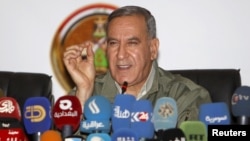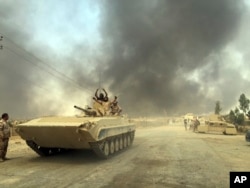Iraq’s parliament on Thursday voted to oust Defense Minister Khalid al-Obeidi, leaving the Iraqi Security Forces without a clear unifying leader in the crucial runup to the military operation to retake the Islamic State stronghold of Mosul.
Obeidi, one of the last Sunni Cabinet ministers in the majority Shi’ite government, was accused of corruption and ousted by a simple-majority (142-102) no-confidence vote after weeks of political wrangling.
Abbas Kadhim, a senior policy fellow at the Johns Hopkins School of Advanced International Studies in Washington, said on Twitter that Obeidi’s removal set a welcome precedent against corruption, but he acknowledged the decision was partly political “score settling.”
In a bitter response to the vote, Obeidi said on Twitter that he had “tried to fight corruption as much as possible.”
Then, in a barely veiled sectarian reference, Obeidi defended his efforts to rebuild the army and prevent the nepotism “that caused Iraq in 2014 to lose 40 percent of its land and displace millions of people.”
Islamic State in 2014, exploiting the deep Sunni grievances resulting from the sectarian nature of Iraq’s government, swept through Iraq and captured large tracts in the west and north of the country.
U.S. lobbying fails
Analysts at the Institute for the Study of War in Washington warned that Obeidi’s ouster could “diminish the U.S.’s ability to effectively coordinate with the ISF on the eve of strategic anti-IS operations in Mosul.”
“The U.S.’s intensive lobbying effort among political parties to retain Obeidi in his position failed, highlighting the limits of U.S. diplomatic influence within Iraq’s shifting political environment,” ISW said on its website.
The institute cautioned that the U.S. could lose its ability to operate in Iraq if a candidate opposed to U.S. and coalition presence in Iraq stepped in.
U.S. defense officials played down the impact of the parliamentary decision.
Operation Inherent Resolve Coalition spokesman John Dorrian said the decisions of the Iraqi parliament were an “internal Iraqi matter.”
“The coalition remains focused on our mission to defeat Daesh by supporting ISF as they continue the campaign to liberate the country,” Dorrian said on Twitter, using a local acronym for the extremist group.
Pentagon spokesman Peter Cook insisted the U.S. has an “excellent working relationship with the Iraqi Ministry of Defense” and “every confidence” that the relationship will continue.
Mosul operation to proceed
According to Michael Knights, Iraq fellow at the Washington Institute for Near East Policy, while not having a minister is not an ideal situation for the military, it will not significantly disturb the Mosul operation.
“CJOC is what really matters, and the leadership of CJOC hasn’t changed,” Knights said.
CJOC is the acronym for the Combined Joint Operations Center in Baghdad, where Iraqi and U.S-led coalition officers work side by side in the fight against IS.
“The minister’s role is really about being the civilian head of the Iraqi military and building the future military, and making decisions that will affect the conduct of the military in the coming years — not so much about day-to-day decisions,” Knights told VOA.
“The trick is how do they [Iraqi officials] replace Obeidi, and how quickly do they do it,” Knights said.














